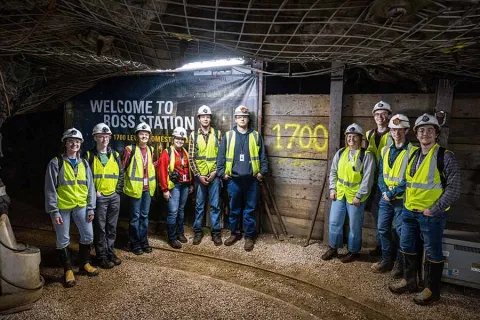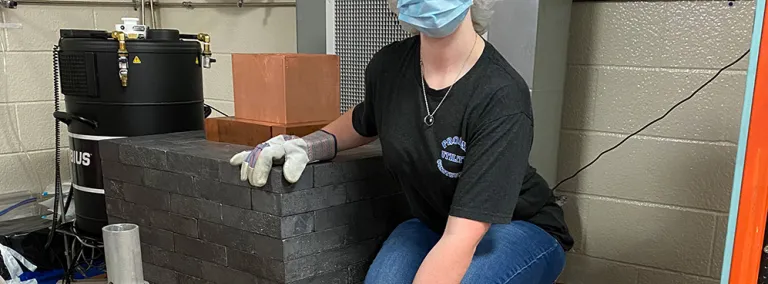DOE grant empowers the science workforce of tomorrow
The DOE’s recent RENEW grant is helping build pathways for future STEM professionals from all backgrounds and identities.
A number of the world-class science experiments located at the Sanford Underground Research Facility (SURF) have lifespans measured in decades. Many of today’s researchers who are working on projects such as the Deep Underground Neutrino Experiment (DUNE), won’t see the conclusion of the science by the end of their careers.
For this reason, inspiring and educating future generations of scientists, who can take up the mantle and continue research efforts, is a vital part of the mission at SURF. The Department of Energy’s recent Reaching a New Energy Sciences Workforce (RENEW) grant to Black Hills State University (BHSU), the University of Michigan (U-M), and Benedictine University, is helping build pathways for future STEM professionals from all backgrounds and identities.
One of the students taking part in research at SURF is Katie Pedneau, a physics major at BHSU and former Davis-Bahcall Scholar. The RENEW grant will fund her work with the Black Hills State University Underground Campus, where she will help maintain low background counting equipment that assesses radiation on a myriad of experiment components.
“I have been loving it. As a college student It is nice to be working in the field pertaining to my degree. From studying in books, to being able to work on a project is something that I have always wanted to experience, and because of this grant I am able to,” said Pedneau.
The grant provides jobs to college students, while giving them hands-on learning and a rare opportunity for to be part of the world-leading science happening at SURF. Baily May, another physics major at BHSU and former Davis-Bahcall Scholar, is an enrolled member of the Oglala Sioux Tribe. May, also a recipient of the RENEW grant, is working alongside Pedneau.
“When you sit in physics class, doing all the math and reading about the science, you can get an idea of how this stuff works. But when you're actually helping with research, or working on a sophisticated instrument, you get a window into the whole picture. It just really adds to the experience. It gives me an understanding of what it actually means to be a physicist,” said May.
Among those leading the implementation of the RENEW grant at BHSU is Dr. Brianna Mount, director of the BHUC and an associate professor of physics at BHSU. Mount said one of her favorite things as a professor is seeing students like May and Pedneau succeed.
"This RENEW grant helps us grab student's attention and they end up loving the research,” Mount said. “Sometimes classes aren't necessarily fun. In my intro to physics class, we are launching balls and calculating where they're going to land. It’s important to start with the basics, but it’s not necessarily what we do every day as a physicist.”
To become a leading researcher in physics requires advanced degrees. The RENEW grant provides funding for undergraduate students to work with graduate level researchers to get a taste of the work they might be doing once they start graduate school. Jordyn Bass, a senior in physics at BHSU, has been working alongside Harvey Birch, a graduate student in physics at U-M. Bass is helping analyze the data coming in from LUX-ZEPLIN (LZ), a world-leading dark matter detector, located at SURF.
“I've always wanted to work at SURF and so this opportunity to work on the actual data from an experiment like LZ is really exciting for me,” said Bass. “Dr. Mount has been amazing, and she helped open doors for me—like this opportunity. I want to pursue grad school and get my Ph.D. in physics, and I would not be able to do this research without her.”
Through the RENEW grant, Bass, May, and Pedneau could spend a summer doing physics research at U-M. Channeling students into graduate school, who might not otherwise have had the inkling or opportunity, is what the DOE’s funding for RENEW is all about.

"This grant enables us to work with these universities to develop a strong science track record," said Dr. Bjoern Penning, principal investigator of the grant and U-M physicist. "In the long term, we hope to attract undiscovered talent into science. They are doing fantastic work and I think we're losing out on talent and potential by not trying to attract students like this."
Dr Matt Wiesner from Benedictine University and Dr Marcelle Soares-Santos from U-M are also working on dark energy and dark matter research. This work along with the involvement of Penning and Mount on the LZ Dark Matter experiment at SURF are laying the groundwork for this collaboration.
